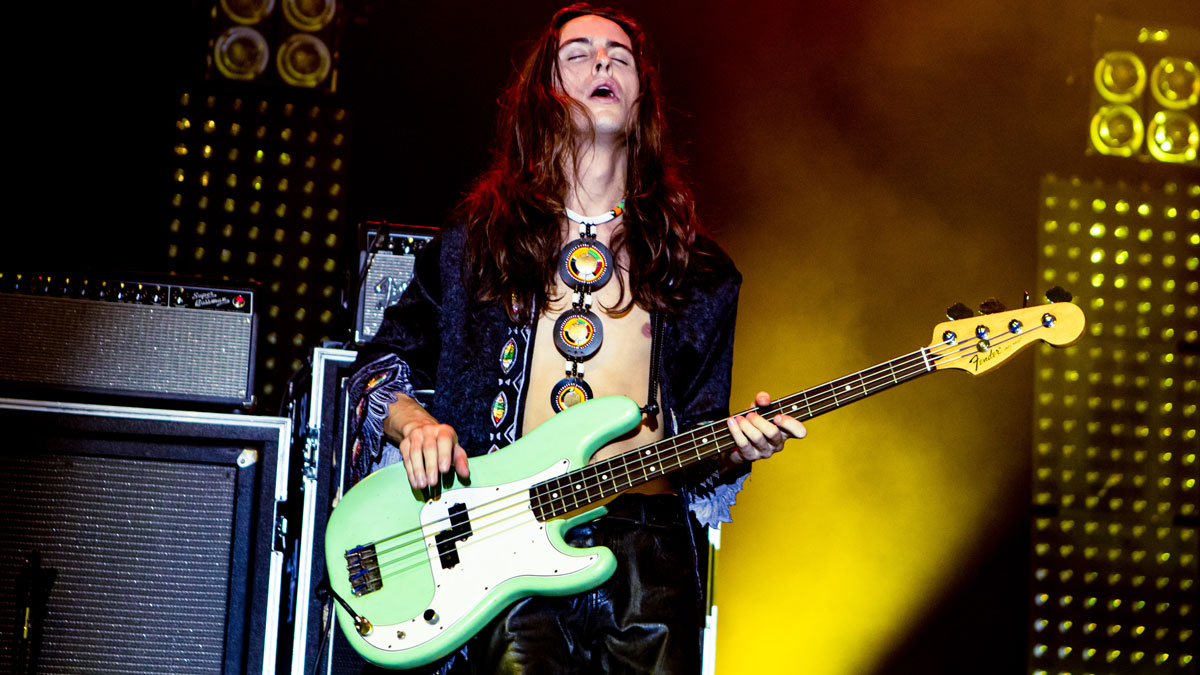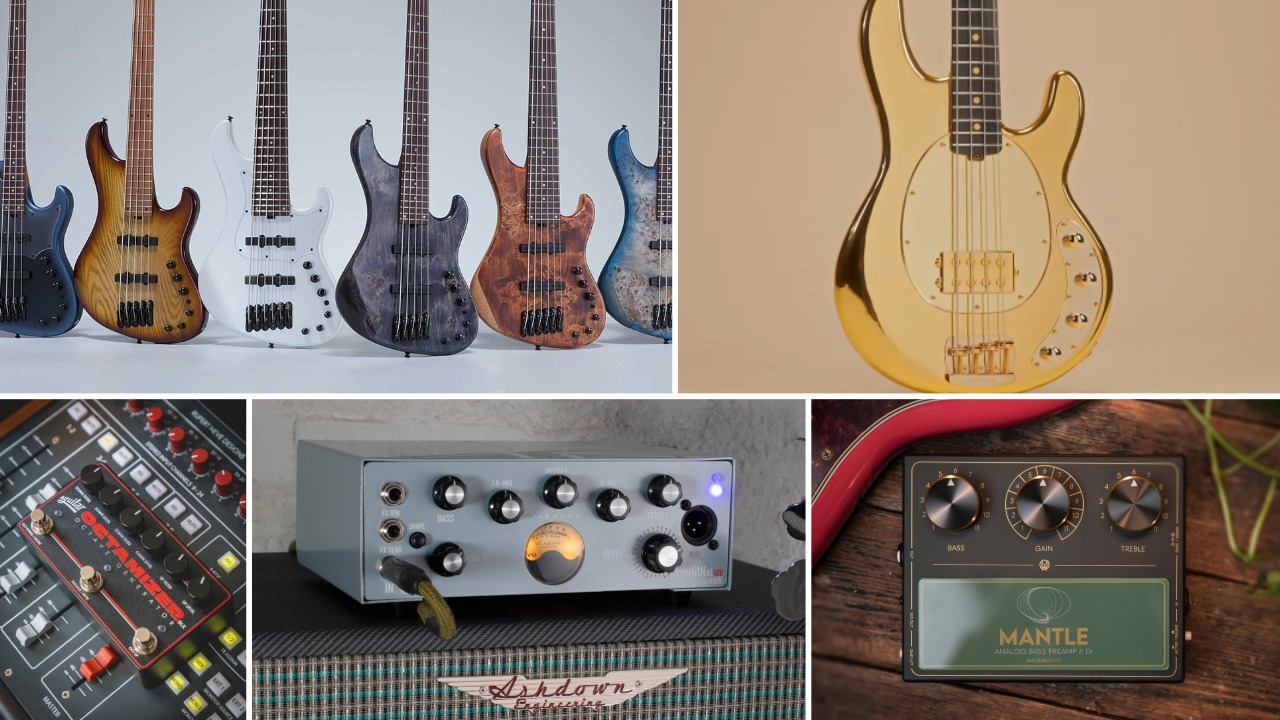Sam Kiszka of Greta Van Fleet on his bass influences and those Led Zeppelin comparisons
Rock's hottest and youngest new act dishes on their upcoming album

When American rock band Greta Van Fleet burst onto the scene just over a year ago, their chivalrous, ‘70s-style rock was a godsend for many. The eight-song double EP, From the Fires [Republic Records, 2017], eschews modern production wizardry in favor of an “under-produced” sound that relies mostly on musicianship and songcraft.
Comparisons to Led Zeppelin have been rampant ever since they debuted Highway Tune in 2017, but this band of teenagers (Zeppelin were barely out of their teens on their first record, mind you), promises to be more than a derivation of their most obvious influence.
Currently hard at work on their first full-length release, Greta Van Fleet has all the ingredients necessary to evolve into a force of their own, without being overtly compared to their predecessors for too long.
Bass Player recently caught up with Sam Kiszka, one of three brothers, including singer Josh and guitarist Jake (along with drummer Danny Wagner), who make up the band. They are currently in the studio with producer Al Sutton in Michigan working on the yet-to-be-titled release. They were also preparing for a European tour, which will probably be in full swing by the time this story hits the internet.
What’s it been like to become so famous, so fast, in such a short amount of time?
What’s happened to us is not a common thing at all, especially in the music industry. It’s amazing that so many people can jump on board with what we’re doing. It’s so great to be able to make music that’s fueling a whole new wave of music. It’s cool to be the band that is the catalyst for this.
Is it weird to have such expectations at such a young age?
All the latest guitar news, interviews, lessons, reviews, deals and more, direct to your inbox!
We went from a one family house in the middle of nowhere right outside of Frankenmuth, Michigan to never being home and living off a tour bus, or living in Airbnbs and hotels, living in studios. There’s no time to be at home… ever. There’s so much to do. There just aren’t enough hours in the day. It’s a lot of pressure, but it’s a hell of a lot of fun.
You’ve mostly played original music your entire career thus far, but who are your influences?
I listened to all the Motown music, like Marvin Gaye, the Four Tops—it’s music that jut moves and makes you feel good. When I picked up bass, the first line I wanted to learn was “I Heard it Through the Grapevine.” I thought that riff was so cool. I probably actually learned the Creedence Clearwater Revival version, but I kept learning these Motown bass lines and I realized it was all James Jamerson. I was blown away. I got into him real heavily.
Anyone else leap out at you?
I listened to Cream, Joe Cocker, Sam & Dave, the Beatles. Those crazy Jack Bruce leads really taught me how to play bass too. John Entwistle too. Listening to people who take the bass and turn it into more of a lead instrument and make bass interesting is what appealed to me. Just playing the root note and following the chord progression is boring and it’s kind of ineffective for a four piece. For the sound that we have, it increases the amount of energy, it increases how interesting the music is to listen to and it ultimately makes the music feel better.
Has touring impacted your playing in a positive way?
I’m a thousand times better than I was last year because we have been playing live so much. So, with the new record, I’ve really been focused on melodies—songs like “Ramble On” [Led Zeppelin II]. People sing that bass line. That’s how you know it’s a fantastic bass line.
John Paul Jones is kind of like the rock n’ roll James Jamerson.
Yeah, you can totally hear Jamerson-like modes and feels in “Ramble On.”
What are you using to track bass on the new album?
A good deal of different things. My one and only bass—a seafoam green p-bass with jazz neck. It’s a ‘50s reissue made in the ‘80s. That thing sounds fantastic and it’s the most comfortable bass I ever played. I used a ’72 tele bass for a few songs and a ’65 p-bass that the producer owns and ’69 p-bass. There are flat wounds on all of them except the ’69. That’s just in case I need a round wound sound, but I do prefer flats. That’s another thing that Jamerson got me into. I like the mellower tone. I crank my tone all the way up. It makes me do things that are counter-intuitive to the sound that I want.
What about your signal chain?
My main sound is the Acme Motown D.I. tube interface, which my producer, Al Sutton, makes. It’s fantastic. It’s got the old Motown circuit. It takes the sound of the bass and puts it right in the spot that you want it. It’s sits back enough, but you can hear all the delicacies of the tone. We run that into a silver 1964 Fender 50-watt Bassman for a little more growl. You don’t have to crank it at all.
Are the Led Zeppelin comparisons intimidating?
Not really. I mean, it’s not like they aren’t the greatest rock n’ roll band ever. It’s just a huge complement. I think the new record will pick up where we left off and show the many sides that Greta Van Fleet has in terms of soundscapes and I think it’ll take the whole a thing up a few notches. We’re also trying to keep live takes. We really value the natural feel of how we play live.
People seem fixated on your age too, but in reality, bands like the Beatles, Black Sabbath and Led Zeppelin were relatively young when they made game-changing records.
The young factor is a novelty. It’s not what we focus on. It’s great that people think we have a mature sound.
If there’s anything reminiscent about the past, I think it’s that there is something chivalrous in your music.
Chivalry. I like that. These days there isn’t a lot of rock n’ roll that gets stuck in your head. The expression of rock n’ roll lately is people being sad or angry. Why can’t we be happy about rock n’ roll? Think about the late ‘60s—Jimi Hendrix and Crosby, Stills and Nash. We can have a positive outlook on this can’t we? People need to start looking at the good because we need that a lot more now than ever.
